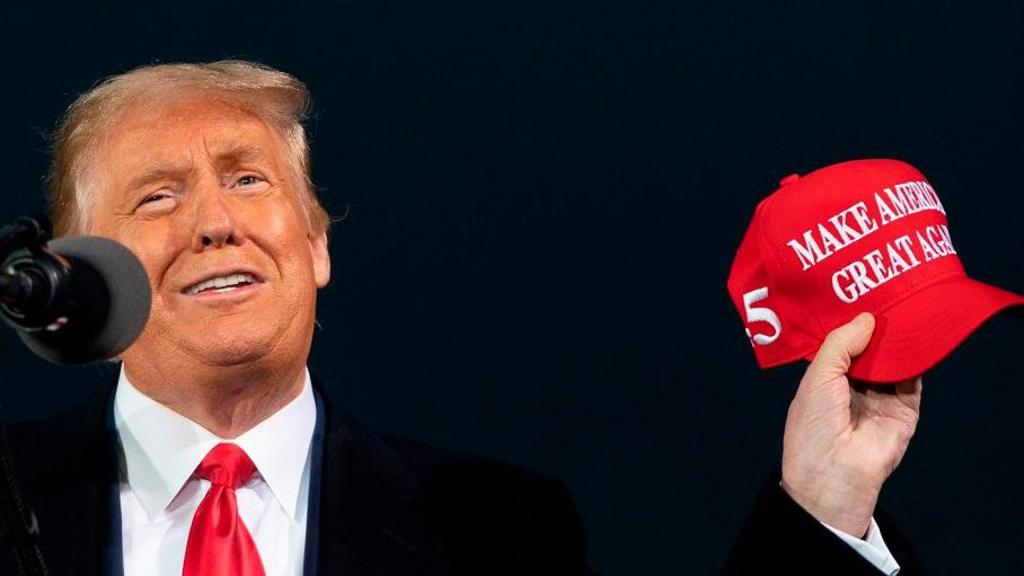A compelling slogan is crucial for any political campaign, serving to galvanize supporters and critique opponents.
Certain slogans transcend election cycles, encapsulating a prevailing national sentiment or a defining moment, such as Barack Obama’s “Yes, We Can” or the Brexit campaign’s “Take Back Control.”
Conversely, some slogans fail to resonate, burdened by awkward phrasing, excessive complexity, and a lack of memorability, reflecting little beyond the desperation of their creators.
Now, political strategist and pollster Chris Bruni-Lowe asserts he has discovered the key to crafting the perfect slogan.
Through analyzing 20,000 campaign messages globally, he has identified eight words that, according to his research, consistently resonate with voters across the political spectrum.
These words are: people, better, democracy, new, time, strong, change, together.
In his new book, “Eight Words That Changed The World,” he emphasizes that these words do not guarantee electoral victory and will not compensate for an uncharismatic candidate or unpopular policies.
Furthermore, randomly combining them, such as “Strong New Time” or “People Better Change,” will not yield positive results.
Instead, they serve as “emotional shortcuts” or fundamental components for crafting slogans that are effective across cultures and languages, according to Bruni-Lowe.
“Voters instinctively understand the promises inherent in words like ‘people,’ ‘better,’ or ‘together’ without needing a detailed policy explanation.”
“They also possess remarkable flexibility: a socialist in South Africa, a conservative in Luxembourg, and a populist in Hungary can each adapt the same word to suit their narrative.”
According to Bruni-Lowe’s analysis, the most frequently used word in successful campaigns is “people.” He cites Bill Clinton’s 1992 slogans “Putting People First” and “For People, For a Change” as examples that significantly contributed to his image as a “people person” in contrast to his opponent, George H.W. Bush.
However, does adhering to this formula risk producing generic, uninspired slogans?
Some of the most impactful slogans, like Boris Johnson’s 2019 general election slogan “Get Brexit Done,” were created with a singular objective in mind.
(Similarly, some of the least effective, such as “Vote for Al Smith and he’ll make your wet dreams come true,” highlighting Smith’s anti-prohibition stance, failed to secure him the 1928 US presidency.)
Bruni-Lowe contends that “bespoke” slogans like “Get Brexit Done” are exceptions that validate his theory.
“Bespoke slogans resonate when a single, unresolved grievance overshadows all other issues, and a decisive outsider offers a concise solution; they are effective for that specific election but lose relevance once the crisis passes.”
Bruni-Lowe’s own contributions to political messaging include “Change Politics For Good” for Nigel Farage’s Brexit Party and “It’s Time” for Jakov Milatovic’s successful 2023 presidential campaign in Montenegro, focused on EU membership.
He dedicates a chapter of his book to “Make America Great Again” (MAGA), a slogan that deviates from his established principles.
While Donald Trump claims to have conceived it in 2012, the concept of “great again” as a political rallying cry dates back over a century, according to Bruni-Lowe.
In 1950, the Conservative Party unsuccessfully campaigned on the promise to “Make Britain Great Again.” Ronald Reagan achieved greater success in 1980 with the slogan “Let’s Make America Great Again.”
Whether Trump was aware of this history when he claimed ownership of the phrase is ultimately insignificant, argues Bruni-Lowe. He successfully transformed MAGA into a brand and a dividing line that has reshaped American politics, for better or worse.
He even registered it with the US Trademark Office for $325 to prevent its use by other politicians.
In the UK, the Brexit campaign’s “Take Back Control” stands out as one of the most memorable slogans in recent years.
It exemplified the trend towards shorter, more impactful slogans, with the three-word formula briefly considered a key to electoral success.
Last year, Labour’s victorious general election campaign distilled its message down to a single word: “Change.”
The Conservative slogan, perhaps less memorably, was “Clear Plan, Bold Action, Secure Future.”
However, traditional slogans may soon become obsolete.
Artificial intelligence is increasingly employed to craft messages tailored to individual voters’ concerns, disseminated via social media and continuously refined for maximum impact.
Bruni-Lowe also notes a growing interest in neuroscience and the application of tools like functional magnetic resonance imaging, which monitors brain activity by detecting changes in blood flow.
This enables researchers to analyze neurological responses to political stimuli, such as campaign advertisements, speeches, and election slogans.
These trends could fundamentally alter democratic politics, reshaping the relationship between elected officials and their constituents.
They could also eliminate the often irritatingly catchy election slogans we have come to know.
Few exemplify this better than one of the first political advertisements aired on US television in 1952.
The 60-second spot aimed to humanize Republican candidate Dwight D. Eisenhower, the former supreme commander of Allied forces in Europe, widely known by his nickname, Ike.
Featuring a remarkably catchy jingle by composer Irving Berlin, “I like Ike” was a Disney cartoon designed to appeal to the broadest possible audience.
Its success led the campaign team to maintain the formula for his re-election bid, adding just one word before, presumably, adjourning for an early lunch.
“I still like Ike” may not conform to Chris Bruni-Lowe’s formula, but it proved to be another winning strategy.
Sign up for our Politics Essential newsletter to read top political analysis, gain insight from across the UK and stay up to speed with the big moments. It’ll be delivered straight to your inbox every weekday.

